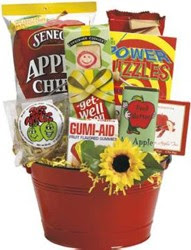 By the time Debbie Clark took Adam, her autistic three year-old son, to a music therapist, he could barely speak. At the music-therapy clinic at California State University in Northridge, USA, therapists encouraged the autistic child to express himself by playing instruments and beating out rhythms on drums. They put conversations to song in order to get Adam talking.
By the time Debbie Clark took Adam, her autistic three year-old son, to a music therapist, he could barely speak. At the music-therapy clinic at California State University in Northridge, USA, therapists encouraged the autistic child to express himself by playing instruments and beating out rhythms on drums. They put conversations to song in order to get Adam talking."In tree months, the change was phenomenal," says Clark. "Before, Adam would never look a stranger in the eye, let alone speak. Now, after his music therapy session, he waves to the therapists and says, "Bye, Jim. Bye, Ron. See you next week." Believe me, that's music to my ears."
Music, researchers around the world are discovering, can help healing in a variety of ways. Burn victims encouraged to sing while having their dressing changed experience less pain. Cancer patients who listen to music and practice improvising on instruments, for example, see their levels of stress hormones drop and their immune systems get stronger. Part of music's power comes from ability to relieve anxiety, which can suppress immune defenses as well as intensify the experience of pain. Music, especially singing, takes a person's mind off the suffering and soothes tension. "By helping patients relax, music eases pain and may even speed recovery," says Richard Fratianne, a noted professor of surgery. The experiences of autistic children like Adam Clark suggest that music's effects reach deeper, even influencing brain development. The therapeutic use of music seems to activate different parts of the brain, including networks associated with motor control, memory, emotion and speech, explains neuroscientist and musician Michael Thaut. In his own work, Thaut is using the close link between music and movement to help people slowed by strokes, cerebral palsy, muscular dystrophy and Parkinson's disease.
Says Northridge music therapist Ron Borczon: "Traditional healers have used songs and drumming for centuries. We're simply rediscovering what they always knew -- that music, through its profound effect on mind and body, can be a potent way to help people get well."
Also read
Healing Power of Laughter
Healing Power of Forgiveness
Coming shortly...
Healing Power of Sleep » Continue reading
Read more on Health

 Visiting a friend or relative in the hospital? Here is a list of gifts a patient will love you for.
Visiting a friend or relative in the hospital? Here is a list of gifts a patient will love you for. Most schoolchildren tend to get three to six viral illnesses a year -- usually when the seasons change, as with the onset of the monsoon, or of winter. If you and your kids can follow these rules, you'll all have a healthier school year.
Most schoolchildren tend to get three to six viral illnesses a year -- usually when the seasons change, as with the onset of the monsoon, or of winter. If you and your kids can follow these rules, you'll all have a healthier school year.